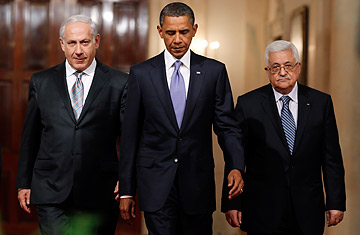
President Barack Obama walks down Cross Hall with Israeli Prime Minister Benjamin Netanyahu (L) and Palestinian President Mahmoud Abbas to make joint statements in the East Room of the White House in Washington September 1, 2010.
(2 of 2)
While Netanyahu doesn't suffer any domestic political cost for the breakdown, Abbas now finds himself exposed: Increasingly enfeebled by the failure of his strategy of pursuing Palestinian rights through Washington, the PA President was unable to win the backing of even his own Fatah movement for the recent talks. The failure of that process underscores the warning by a top Israeli security chief, relayed in one of the recently released WikiLeaks cables, that Abbas is unlikely to survive politically beyond next year.
A frustrated Abbas has been threatening to seek recognition of Palestinian statehood on the 1967 borders at the United Nations. This week's announcement by Brazil and Argentina of their recognition of such a state on those borders is a reminder of the potential of Palestinian diplomatic lobbying to put pressure on Israel to accept what is, essentially, an international consensus on the parameters of a two-state solution.
But for now, going the U.N. route remains an idle threat by Abbas, on a par with his warning that he's considering dissolving the Palestinian Authority and forcing Israel to resume control of the West Bank. Despite its exasperation at the failure of the Administration to hold Netanyahu's feet to the fire, there's little sign of the Palestinian leadership being willing to act at odds with Washington's wishes.
The great hope of the Palestinians and their Arab backers will be that the stalemate prompts the Obama Administration to put its own ideas on the table on the parameters of a two-state solution, committing Washington to a map far closer to the international consensus than Israel is willing to go voluntarily. But a President who'll face the battle of his life to win reelection two years from now will be reluctant to take the domestic political consequences of squeezing Israel.
So it's a safe bet than when Secretary of State Hillary Clinton explains the Administration's next steps in a speech scheduled for Friday, she'll be talking up prospects for making progress by reviving the indirect talks with a U.S. mediator that preceded the direct talks fiasco. "The tug of war inside the administration is [over] whether to make [Clinton's] pitch strong and determined but without saying anything of substance, or whether she needs to say something about U.S. views to bring the Palestinians back to the table," a senior U.S. Middle East hand told Politico's Laura Rozen on Tuesday.
The Administration's track record suggests it'll be long on ambition and determination, and short on specifics. After all, just three weeks ago, her spokesman P.J. Crowley said there was no need to discuss a Plan B. "We have a Plan A. We think it's a good Plan A." He was referring to the one scrapped earlier this week.
